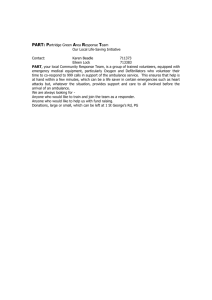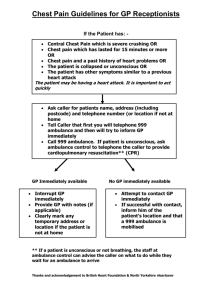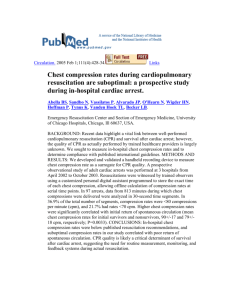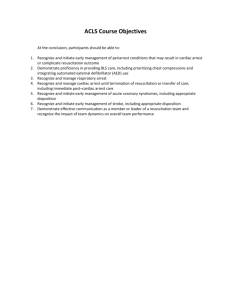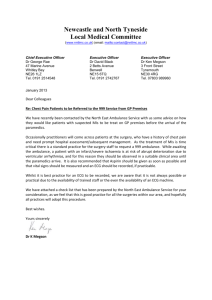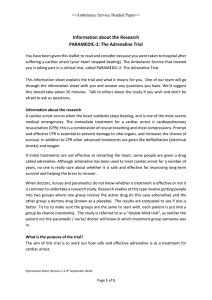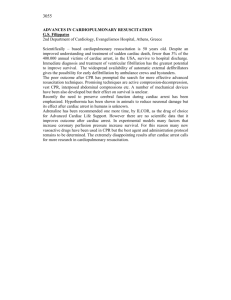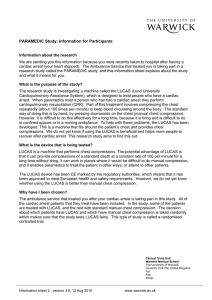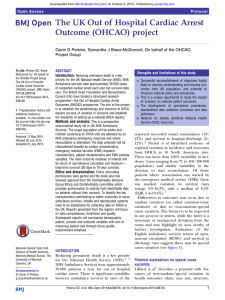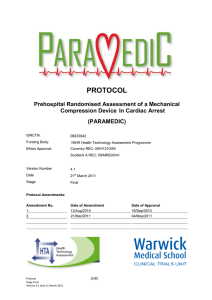Document 12448405
advertisement
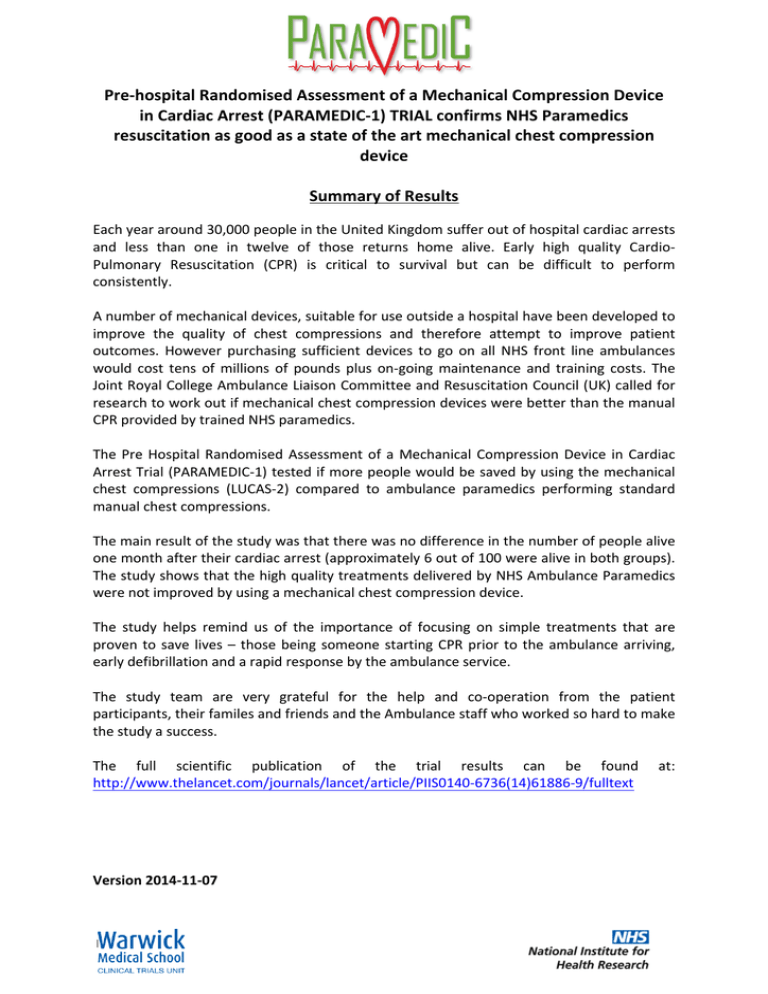
Pre-­‐hospital Randomised Assessment of a Mechanical Compression Device in Cardiac Arrest (PARAMEDIC-­‐1) TRIAL confirms NHS Paramedics resuscitation as good as a state of the art mechanical chest compression device Summary of Results Each year around 30,000 people in the United Kingdom suffer out of hospital cardiac arrests and less than one in twelve of those returns home alive. Early high quality Cardio-­‐ Pulmonary Resuscitation (CPR) is critical to survival but can be difficult to perform consistently. A number of mechanical devices, suitable for use outside a hospital have been developed to improve the quality of chest compressions and therefore attempt to improve patient outcomes. However purchasing sufficient devices to go on all NHS front line ambulances would cost tens of millions of pounds plus on-­‐going maintenance and training costs. The Joint Royal College Ambulance Liaison Committee and Resuscitation Council (UK) called for research to work out if mechanical chest compression devices were better than the manual CPR provided by trained NHS paramedics. The Pre Hospital Randomised Assessment of a Mechanical Compression Device in Cardiac Arrest Trial (PARAMEDIC-­‐1) tested if more people would be saved by using the mechanical chest compressions (LUCAS-­‐2) compared to ambulance paramedics performing standard manual chest compressions. The main result of the study was that there was no difference in the number of people alive one month after their cardiac arrest (approximately 6 out of 100 were alive in both groups). The study shows that the high quality treatments delivered by NHS Ambulance Paramedics were not improved by using a mechanical chest compression device. The study helps remind us of the importance of focusing on simple treatments that are proven to save lives – those being someone starting CPR prior to the ambulance arriving, early defibrillation and a rapid response by the ambulance service. The study team are very grateful for the help and co-­‐operation from the patient participants, their familes and friends and the Ambulance staff who worked so hard to make the study a success. The full scientific publication of the trial results can be found at: http://www.thelancet.com/journals/lancet/article/PIIS0140-­‐6736(14)61886-­‐9/fulltext Version 2014-­‐11-­‐07 DRAFT 0.1 8-­‐10 Additional information The University of Warwick’s Clinical Trials Unit initiated the Pre Hospital Randomised Assessment of a Mechanical Compression Device in Cardiac Arrest Trial (PARAMEDIC-­‐1) in partnership with Coventry, Surrey and Southampton Universities, West Midlands, North East, South Central and the Welsh NHS Ambulance Services. The PARAMEDIC-­‐1 trial evaluated the LUCAS-­‐2 mechanical chest compression device. The trial took place across four Ambulance Services who serve a population of 13 million people over 24,000 square miles. Ambulance emergency vehicles (rapid response and standard ambulances) from 91 ambulance stations were allocated to carry a LUCAS-­‐2 device or to continue with current standard treatment (manual chest compressions). If the first ambulance to arrive had a LUCAS-­‐2 device the crew were able to use it. If the first ambulance did not contain a LUCAS-­‐2 device then standard manual CPR was provided by the highly trained NHS Paramedics. Between April 2010 and June 2013 a total of 418 emergency vehicles were involved in the trial of which 287 were double manned ambulances and 131 single manned rapid response vehicles. The emergency vehicles involved in the trial attended 11,171 potential cardiac arrest patients and the proportion of cases where resuscitation was attempted was 41% and this was similar in both groups. A total of 4471 patients were enrolled in the study of which 1652 were in the group where emergency vehicles carried the LUCAS-­‐2 device. A total of 985 patients were treated with the device. Patients who were known, or believed to be under 18 years of age, those known or apparently pregnant and cases where the cardiac arrest was the result of trauma were not eligible for the trial and received standard treatment. PARAMEDIC-­‐1 is the largest clinical trial in cardiac arrest conducted in the UK and one of the largest to evaluate a mechanical chest compression device. Note: PARAMEDIC-­‐1 is independent research funded by the National Institute for Health Research (NIHR). The views expressed are those of the author(s) and not necessarily those of the NHS, the NIHR or the Department of Health DRAFT 0.1 8-­‐10

